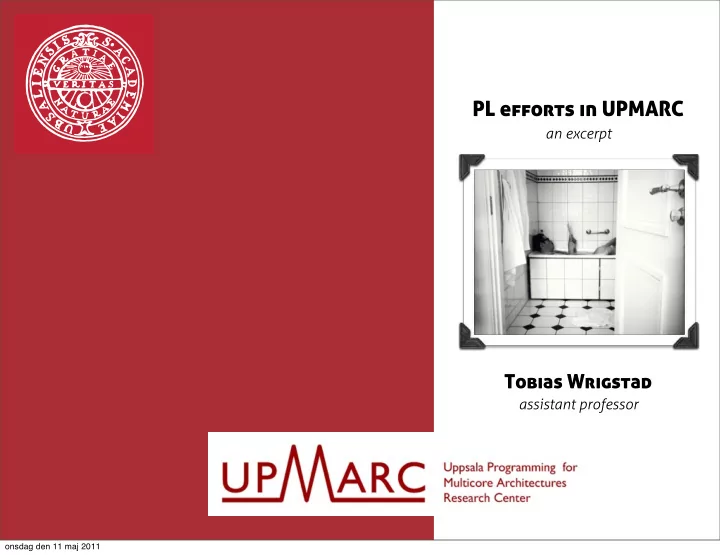

PL efforts in UPMARC an excerpt Tobias Wrigstad assistant professor onsdag den 11 maj 2011
Short Bio ’06 PhD @ Royal Inst. of Technology, Sweden ’07 Postdoc @ Purdue University, IN US ’09 Associate prof @ Stockholm University ’10 Assistant prof @ Uppsala University Aliasing in OOPLs (Pluggable) type systems Concurrent and parallel programming Dynamic programming languages onsdag den 11 maj 2011
Spaghetti Code (~1968) onsdag den 11 maj 2011
Spaghetti Data (present day) Races etc. Thread B Object Thread A Reference Visualisation of a heap from an OO program onsdag den 11 maj 2011
Capsule Summary Spaghetti data + ubiquitous parallelism is a no-go — However, sharing state is key to performance! Our goal • Bring order to object-oriented data Our approach • Enable programmers to express sharing, locality, etc. • Use this information for checking and parallelisation (correctness) (e ffi cency) • Avoid problems (races, compositionality, etc.) by design onsdag den 11 maj 2011
P 1 r s o t p o Thread-Local Heaps in Loci [ECOOP 2009] s a l + Shared accesses identified Races + Fine grained etc. + Pluggable + Low syntactic overhead … – Shared heap still a mess – Locks are not compositional Thread 1 Thread 2 Thread n Shared heap http://loci.java.net/ onsdag den 11 maj 2011
P 2 r n o d p Active Object 2 o s Isolated Active a l Objects in Joelle [TOOLS 2008] + Compositional + No races + Low syntactic overhead – Coarse grained Immutable – No internal (no races) (no access) parallelism Active Object n Transferrable (no races) Active Object 1 onsdag den 11 maj 2011
The Way Forward: Our Core Design + = Loci Joelle Joelle 2.0 onsdag den 11 maj 2011
Ultimate Goals • Replace Java as the safe mainstream programming language Simple & gradual system, legacy, do not ignore the programming craft… • Deal with parallelism and concurrency better than Erlang E ffi ciency, locality, migration, high-level errors only… • Without compromising with object-orientation Support shared mutable state as e ff ortlessly as possible, encapsulation… onsdag den 11 maj 2011
Current Goals • Avoid races, deadlocks, subtle memory model considerations • Better utilise shared resources (caches, shared bu ff ers, etc.) • Implicit parallelism where possible • Facilitate manual and automated reasoning • Language a superset of Java (or C++) Interested industry: Ericsson, ABB, IBM, Oracle (no real committment from anyone yet) Impact: OOPSLA 2010, ECOOP 2009, APLAS 2008, TOOLS 2008 ( Community: sc IWACO ’07–11; is UPMARC summer school ’10; pc FTfJP ’11, IWACO ’11, OOPSLA ’11, ECOOP ’12 je LNCS state-of-the-art aliasing in OOP Journal) onsdag den 11 maj 2011
The Way Forward: Our Core Design + = Loci Joelle Joelle 2.0 Ownership types E ff ect systems Alias Analysis Inference onsdag den 11 maj 2011
N e w ! Fine-grained parallelism inside active objects Use run-time adaptation techniques for performance Active object model is safe by design onsdag den 11 maj 2011
N e w Static ! Bring structure to active Dynamic object subheap Safe sharing Preserve isolation Minimal clone operations Safe transfer Ownership types E ff ect systems Alias Analysis Inference onsdag den 11 maj 2011
N e w Static ! Allow implicit parallelism Dynamic Guarantee race freedom under sharing Scheduling to maximise cache utilisation Fine- grained sharing Prefetching from message queue analysis Ownership types E ff ect systems Alias Analysis Inference onsdag den 11 maj 2011
N e w Static ! Dynamic Improve e ff ect analysis result Compile fast-path and avoid synch to main memory Simplify coding with shared and unshared values Ownership types E ff ect systems Alias Analysis Inference onsdag den 11 maj 2011
N e w Static ! Dynamic Lighten annotation burden Facilitate reuse Facilitate refactoring Ownership types E ff ect systems Alias Analysis Inference onsdag den 11 maj 2011
Immediate UPMARC Synergy Programs in our system exhibit strong properties that facilitate program analysis • e.g., alias freedom, locality information, e ff ects of expressions • Previous work on verification @ UU could capitalise on this Parosh Abdulla Migrating legacy code to active objects • Can it be done automatically? • Inference in isolated enclosures — a smaller problem? • Maybe annotations can be partially inferred? Jonathan Cederberg Ownership and e ff ect information used for scheduling, resource management Wang Yi David Black-Scha ff er onsdag den 11 maj 2011
Obstacles & Some Open Questions Need more ”warm bodies” (PhD students & PostDocs) Need representative legacy code (tentative from ABB) What are the e ff ects on common idioms and programming practises? Inference vs. programmer annotations—what is a good balance? • Inference is flexible but brittle • Annotations are stable but stale Will a single active object concept fit all circumstances? How to feedback that we cannot run something in parallel to the programmer? … onsdag den 11 maj 2011
Our Unique Footprint: Related Work (Excerpt) Flexible yet powerful aliasing constraints; ownership-based e ff ects; Proactive, Scoop, Akka, etc. — active object systems for Java, 2D rep splitting Ei ff el, Scala; no isolation guarantees, not for parallel programs Active-object based DPJ — share some ideas but for threads and task-based parallelism only; extreme programming overhead Combination of anno- tations and inference; full X10 — captures where a computation takes place in the ”place static checking type” Both coarse-grain (AO) CoBoxes, JCoBoxes — similar ideas for encapsulation but and fine-grain (task, etc.) completely dynamic parallelism FlexoTask and StreamFlex — shares ideas for encapsulation but Run-time reliance on for stream programming ownership and e ff ects for A wealth of systems for ownership types, linearity, e ff ect scheduling and implicit systems (Clarke, Boyland, Noble, Vitek, Aldrich, Rinard, Liskov, …) parallelism Ownership types inference work by Milanova et al., Ma & Foster Consider programming surroundings & legacy Jade — implicit parallelism; Futures; Erlang; … onsdag den 11 maj 2011
Thank you! Questions? onsdag den 11 maj 2011
Recommend
More recommend